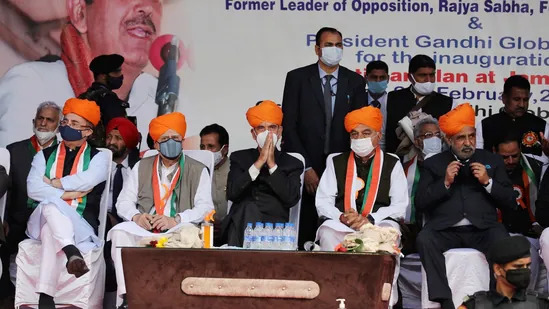
Congress has reconstituted and expanded its parliamentary groups in the Lok Sabha and Rajya Sabha, bringing in senior figures such as former Union ministers P Chidambaram, Manish Tewari, and Ambika Soni, as well as former Madhya Pradesh chief minister Digvijaya Singh, ahead of the monsoon session of Parliament, which is set to begin on Monday.
Sonia Gandhi, the party’s president, made the announcement in a letter on Sunday. She stated that the reshuffle was necessary for the party’s effective functioning in both houses of Parliament. “These groups will meet daily during the session and can meet during the inter-session periods as well where Parliament issues are concerned,” the Congress president wrote.
After two short sessions, the monsoon session is expected to be a full one, with the opposition likely to corner the government on the economy, the handling of the Covid-19 pandemic and vaccinations, job losses, and contentious farm laws.
The letter also put to rest speculation about the future of West Bengal MP Adhir Ranjan Chowdhury, who was expected to be replaced by Shashi Tharoor or Manish Tewari.
According to the letter, Chowdhury will remain the party’s Lok Sabha leader, but Tharoor and Tewari will also be part of the group, indicating that Sonia Gandhi wants more heads in the party’s parliamentary decision-making process.
Assam MP Gaurav Gogoi (deputy leader), K Suresh (chief whip), Ravneet Singh Bittu, and Manickam Tagore will also be part of the Lok Sabha group (both whips).
The Rajya Sabha hierarchy, which previously included Mallikarjun Kharge as opposition leader, Anand Sharma as deputy leader, and Jairam Ramesh as chief whip, will now include Chidambaram, Soni, and Singh—three senior leaders with extensive experience in both Parliament and the party.
Different roles will be assigned to the various groups. Getting the numbers together, coordinating with various political parties, and deciding on key floor issues like bill support and government cooperation.
It will also determine which issues need to be addressed and how the Congress will respond to issues raised by other political parties.
Only a few weeks ago, the Congress entrusted Kharge with the task of coordinating with the other parties in Parliament. He is expected to play a key role in Parliament, as the ruling dispensation has benefited from the lack of opposition unity in passing key bills such as Triple Talaq, the bifurcation of Jammu and Kashmir as Union territories, and the repeal of the death penalty.
The party hopes to mend fissures within the opposition camp with the inclusion of senior, more accessible leaders, with a few regional parties attempting to go it alone in the upcoming state elections and the 2024 general elections.
The Congress already has two panels: a parliamentary strategy group led by Gandhi that looks into bigger issues like parliamentary functioning, and a smaller group led by P Chidambaram that scrutinises all government bills.







